|
|
|
Sort Order |
|
|
|
Items / Page
|
|
|
|
|
|
|
| Srl | Item |
| 1 |
ID:
142225
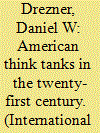

|
|
|
|
|
| Summary/Abstract |
Think tanks have been a part of the United States’ foreign policy establishment for more than a century. They have played a significant role at key junctures in US foreign policy. Two inflection points, however, have dramatically altered the think tank landscape in the last 15 years. The 11 September 2001 terrorist attacks caused these organizations to dramatically expand their staff and overhead, as the demand for their services increased. The 2008 financial crisis subsequently left many of these same think tanks financially overextended. This circumstance forced these organizations to seek out more unconventional funding arrangements, imposing new constraints at the exact moment that their competitive environment intensified. In the twenty-first century, US foreign policy think tanks will maintain their relevancy by moving beyond what made them relevant in the last century.
|
|
|
|
|
|
|
|
|
|
|
|
|
|
|
|
| 2 |
ID:
142220
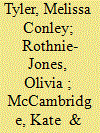

|
|
|
|
|
| Summary/Abstract |
The future of foreign policy think tanks should involve acting as a training ground for the next generation of international affairs professionals. Internships are widely recognized as a way of improving young people’s skills and employment prospects. A case study of the Australian Institute of International Affairs’ (AIIA’s) internship program shows how foreign policy institutes can form a bridge between the academic grounding that universities provide and the rigours and requirements of a career in international affairs. Survey results from more than 100 interns showed an overwhelmingly positive reaction to their internship experience, with over 98 percent recommending the program. A range of learning outcomes and career benefits were reported. Foreign policy institutes wishing to contribute to career development should consider introducing internship programs that include goal setting, high-quality supervision, expert training, and career advice. They can help build the future of the field one internship at a time.
|
|
|
|
|
|
|
|
|
|
|
|
|
|
|
|
| 3 |
ID:
142219
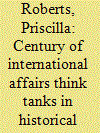

|
|
|
|
|
| Summary/Abstract |
This essay surveys the operations of foreign policy think tanks, and how they have functioned to create transnational knowledge networks, since their emergence in the early twentieth century, around the First World War. It discusses how patterns of linkages among foreign policy think tanks changed and evolved over time, and were linked to broader Anglo-American, imperial, and internationalist networks and relationships, and to the changing international political climate and configuration. It suggests some ways in which think tanks contributed to Cold War interchanges between different states, especially to Soviet bloc–Western relations and Asian–Western relations. It concludes by discussing the recent proliferation and frequent globalization of foreign policy think tanks, and suggests how such trends may develop in future.
|
|
|
|
|
|
|
|
|
|
|
|
|
|
|
|
| 4 |
ID:
142222
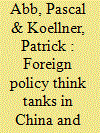

|
|
|
|
|
| Summary/Abstract |
The role of foreign policy think tanks (FPTTs) in policy-making has received substantial scholarly attention, with most studies focusing on US-based organizations. In this article, we seek to address this spatial bias by discussing the development and roles of FPTTs in two East Asian countries, China and Japan. China today hosts the second-largest think tank scene in the world, and many FPTTs have received influxes of funding and increased the academic qualifications of their staffers in recent years. Japan also hosts a sizable array of think tanks, but many of them operate on a for-profit basis and do not focus on public policy issues; Japan has very few genuine FPTTs. In both countries, FPTTs are in many ways linked to the government. While they seek to inform and influence foreign and security policy as well as public discourse on international affairs, they usually do not act as agenda setters. By examining the recent case of constitutional reinterpretation in Japan, which aimed to enable collective self-defence, we show how Japanese public intellectuals, including think tankers, helped to legitimize this controversial move and how Chinese FPTTs reacted publicly by providing media commentary in support of the official government line.
|
|
|
|
|
|
|
|
|
|
|
|
|
|
|
|
| 5 |
ID:
142221
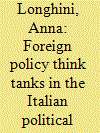

|
|
|
|
|
| Summary/Abstract |
This paper explores the current state of foreign policy think tanks in Italy through an in-depth analysis of its main protagonists. These actors are not always immediately recognizable because the sector is not regulated and little data is publicly accessible. Empirically, the analysis is conducted through a web survey, in-person interviews, and a reputational analysis of seven organizations. This work not only identifies who these actors are and what they do, but it does so taking into account the political context. Such an institutional argument suggests that foreign policy think tank ties to the Italian political system are essential. At the same time, those ties pose serious limitations for the evolution of these organizations, especially in a transnational perspective.
|
|
|
|
|
|
|
|
|
|
|
|
|
|
|
|
| 6 |
ID:
142223
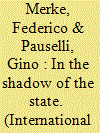

|
|
|
|
|
| Summary/Abstract |
This paper analyzes the role of think tanks as members of civil society in Latin America. Our goal is to present an initial conceptualization and measurement of the role think tanks play in the foreign policy sub-subsystem. We focus on three of the most influential think tanks in the region: CARI (Argentina), CEBRI (Brazil), and COMEXI (Mexico). This paper suggests that the state’s characteristics and the character of its civil society determine the type and strength of its think tanks. This paper also considers the challenges that think tanks face in Argentina, Brazil, and Mexico more generally by comparing each chosen think tank’s board, public activities, presence in local media and social media, and publications. We conclude that there have yet to be significant incentives and resources available for thinks tanks in Argentina, Brazil, and Mexico to grow and, thus, Latin American think tanks’ activities typically follow their governments’ agendas.
|
|
|
|
|
|
|
|
|
|
|
|
|
|
|
|
| 7 |
ID:
142224
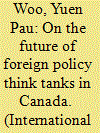

|
|
|
|
|
| Summary/Abstract |
Will foreign policy think tanks face the same fate as so many “old media” organizations? The average Canadian has better access to global news and analysis today through a handheld device than the expert analyst of 30 years ago working from published sources at a foreign policy think tank. Furthermore, the increasingly blurred boundaries between domestic and international issues have made the distinction between foreign policy and domestic policy less clear. Canadian foreign policy think tanks have to respond to these challenges, as well as to the broader problem of parochialism in Canadian society.
|
|
|
|
|
|
|
|
|
|
|
|
|
|
|
|
| 8 |
ID:
142217


|
|
|
|
|
| Summary/Abstract |
Think tanks in the last half-century have replaced universities as the main source of new policy ideas. The big Washington think tanks have taken their place alongside interest groups, media, and political parties as among the most influential organizations in American politics, including foreign policy. The author discusses the world of the Washington think tanks, how and why they are able to influence policy in ways that university-based academics do not, and the attractions and negatives of a think tank career. He analyzes the recent trends in think tanks, including their global spread. He concludes by asking if think tanks have now become victims of their own earlier success.
|
|
|
|
|
|
|
|
|
|
|
|
|
|
|
|
| 9 |
ID:
142218


|
|
|
|
|
| Summary/Abstract |
In this interview, Rohinton Medhora, the president of the Centre for International Governance Innovation (CIGI), joins John de Boer (senior policy adviser at the United Nations University) for a conversation exploring the notion of think tanks as influence peddlers and the future of foreign policy think tanks in Canada.
|
|
|
|
|
|
|
|
|
|
|
|
|
|
|
|
|
|
|
|
|